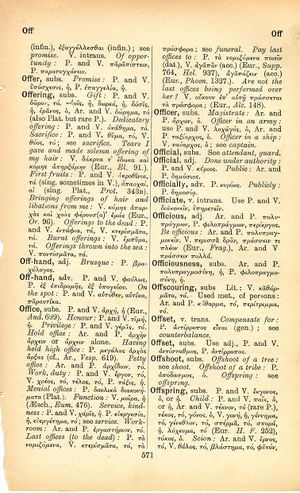office
ἀσκεῖν περὶ τὰ νοσήματα δύο, ὠφελεῖν ἢ μὴ βλάπτειν → strive, with regard to diseases, for two things — to do good, or to do no harm | as to diseases, make a habit of two things — to help, or at least, to do no harm
English > Greek (Woodhouse)
subs.
P. and V. ἀρχή, ἡ (Eur., And. 699). Honour: P. and V. τιμή, ἡ. Privilege: P. and V. γέρας, τά. Hold office: Ar. and P. ἀρχὴν ἄρχειν or ἄρχειν alone. Having held high office: P. μεγάλας ἀρχὰς ἄρξας (cf., Ar., Vesp. 619). Petty office: Ar. and P. ἀρχίδιον, τό. Work, duty: P. and V. ἔργον, τό, V. χρέος, τό, τέλος, τό, P. τάξις, ἡ. Menial offices: P. δουλικὰ διακονήματα (Plat.). Function: V. μοῖρα, ἡ (Aesch., Eum. 476). Service, kindness: P. and V. χάρις, ἡ. P. εὐεργεσία, ἡ, εὐεργέτημα, τό; see service. Workroom: Ar. and P. ἐργαστήριον, τό. Last offices (to the dead): P. τὰ νομιζομενα, V. κτερίσματα, τά, τὰ πρόσφορα; see funeral. Pay last offices to: P. τὰ νομιζόμενα ποιεῖν (dat.), V. ἀγαπᾶν (acc.) (Eur., Supp. 764, Hel. 937), ἀγαπάζειν (acc.) (Eur., Phoen. 1327.). Are not the last offices being performed over her? V. οὔκουν ἐπʼ αὐτῇ πράσσεται τὰ πρόσφορα; (Eur., Alc. 148).

